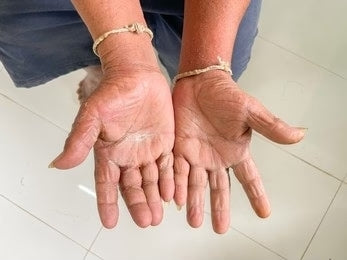The medical word for the condition that thickens and hardens the connective tissues of the skin is scleroderma. Scleroderma patients frequently experience discomfort and excessive self-consciousness. The illness manifests as dry, itchy, and stiff skin, along with weariness, red patches on the hands and cheeks, and dry mouth. Because it's an autoimmune disease, each person experiences the symptoms differently.
Many medications, including glucocorticoids and penicillamine, are used to treat Scleroderma; however, their effectiveness is questionable, and they also cause long-term skin damage. It is preferable to use some Ayurveda home remedies rather than dangerous medicines. Many foods, spices, and herbs have been shown to have positive impacts on people with Scleroderma. All of the natural and very effective home treatments will provide the intended good results without causing any negative side effects in a few months.
SOME USEFUL HOME REMEDIES FOR SCLERODERMA
APPLY LOCALLY
1. TURMERIC
Because of this herb's excellent Ayurveda qualities, it has been employed in Ayurveda for many years. Turmeric has a bitter flavor, is light in texture, and becomes pungent and hot in intensity after digestion, according to Ayurveda. The body's Pitta, Vata, and Kapha doshas are all balanced by turmeric. Its anti-inflammatory and antioxidant qualities provide a therapeutic effect on Scleroderma-affected areas while shielding our skin from inflammation and oxidative damage caused by ROS species.
- Using a half cup of water, thoroughly mix 1-2 tablespoons of turmeric until a fine paste forms. Using a cotton ball, apply this paste directly to the affected area.
- Additionally, you can directly apply turmeric powder to the afflicted area. This will be beneficial.
2. ONION
The anti-inflammatory and antioxidant qualities of onions counteract the effects of free radicals. The rough, taut skin areas become softer as a result. Owing to edema, puffiness, stiffness, and tightness in the hands and fingers, it can occasionally become extremely uncomfortable. The anti-inflammatory characteristic of onions aids in the removal of stiffness and swelling.
- Using a gentle touch, apply the onion (cut into two halves) to the affected area of the skin. Spend 15 to 20 minutes messaging it each day.
- Conversely, using cotton balls, you can also apply onion juice to the afflicted area of the skin.
3. FISH OIL
Omega-3 fatty acids, which aid in eliminating free radicals from our bodies, are mostly found in fish oil. It also supports the immune system's appropriate operation and has antioxidant qualities. Salmon, tuna, cod liver, and herring are among the seafood that are high in omega-3 fatty acids.
- For alleviation, directly apply fish oil to scaly areas on a daily basis. Include cod liver, salmon, and tuna in your daily diet as well.
4. TRIPHALA DECOCTION
The three plants that makeup Triphala are Amalaki (Emblica officinalis), Bibhitaki (Terminalia bellerica), and Haritaki (Terminalia chebula). Together, these three plants can shield us against a range of illnesses. This decoction helps heal wounds well in people with scleroderma.
- Make a Triphala infusion and bathe the afflicted area twice a day.
ORAL CONSUMPTION
TULSI LEAVES
With a plethora of health benefits, including antibacterial, antifungal, antipyretic, antiseptic, and anti-cancerous qualities, tulsi is an incredible herb. It does a great job of managing all cardiac, respiratory, and lifestyle diseases.
- You can add tulsi leaves to a variety of dishes.
- You can have one cup of tulsi tea every morning.
KNOW MORE

